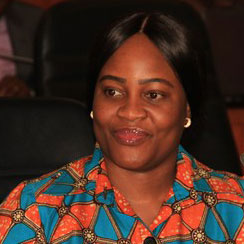
Nigerian pension funds, once small in size and riddled with corruption, are ridding themselves of their old ways and becoming important drivers of the country’s economy, Chinelo Anohu-Amazu, head of Nigeria’s National Pension Commission, has said. Pension funds now total NGN5.84tr ($19 bn), the bulk of which — as much as 69% — is invested in federal government bonds. “The idea,” Anohu-Amazu told GlobalMarkets, “is to move away from government bonds and into much needed infrastructure and real estate. That’s a push we’re working really hard on.
“We have to create a dramatic shift towards infrastructure.”
Nigeria, a country with a population of over 170 million, is in dire need of better roads, bridges and public transport. In its Global Economic Index for 2016-17, the World Economic Forum said the lack of infrastructure was the biggest problem when trying to do business in Nigeria — ahead, even, of corruption — and ranked the country’s infrastructure 132nd out of the 138 countries it tracks around the world.
Pension fund money could become a real force in changing that state of affairs, Anohu-Amazu said. She said she was focused on the many millions of Nigerians in need of a home, and the lack of modern railways around the country.
Because Nigeria’s infrastructure is so unsatisfactory, any improvement to it could unleash huge economic potential.
Nigerian regulators are keenly aware of that fact. For that reason, they approved last month plans to enable the investment of up to $20bn of pension money to that area of the economy.
Beyond that, Anohu-Amazu also wants to divert money towards private equity funds. She thinks corporate governance standards would improve if private equity investors were more active participants in Nigeria’s economy, thanks to the scrutiny they place on the firms in which they invest.
The more Nigerian workers have pension schemes, the more likely these ambitions are to be realised. For that reason, the Pension Commission is also focusing efforts on trying to raise the number of contributors — as things stand, only seven million contribute. “There is scope for raising it, especially when you realise there’s a whole gamut of people in the informal sector.”
That’s not an easy task, however. “Most of them are totally off the grid,” she said. “You don’t know where they are, you don’t know where they work.”
One other problem she has had to tackle head on, since she was confirmed as head of the commission two years ago, is that of corruption. “We had a lot of issues with the pension system in Nigeria — a lot of transparency issues, cases of mismanaged funds.”
Anohu-Amazu is adamant the commission is clean, having stamped out malpractice. “We have totally eradicated it,” she said.
But though the commission might now be in working order, there are still indications of problems with fraud in some parts of the pensions sector. Earlier this year, the Nigerian watchdog Economic and Financial Crimes Commission reportedly arrested Nelly Mayshak, director general of the Pension Transitional Arrangement Directorate — an institution dealing with legacy customers of a previous pension scheme — over an alleged NGN2.5bn fraud.
